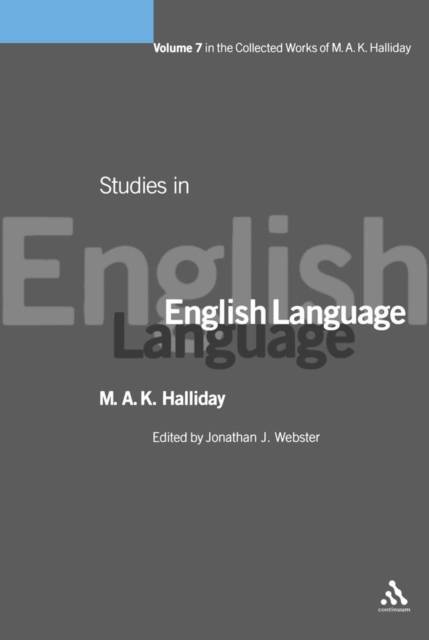
Bedankt voor het vertrouwen het afgelopen jaar! Om jou te bedanken bieden we GRATIS verzending (in België) aan op alles gedurende de hele maand januari.
- Afhalen na 1 uur in een winkel met voorraad
- In januari gratis thuislevering in België
- Ruim aanbod met 7 miljoen producten
Bedankt voor het vertrouwen het afgelopen jaar! Om jou te bedanken bieden we GRATIS verzending (in België) aan op alles gedurende de hele maand januari.
- Afhalen na 1 uur in een winkel met voorraad
- In januari gratis thuislevering in België
- Ruim aanbod met 7 miljoen producten
Zoeken
Omschrijving
This is the seventh volume in the Collected Works of Professor M. A. K. Halliday: Studies in English Language. Topics covered in the papers from the section on "Theoretical foundations" include transitivity, theme-rhyme, mood, and modality in English. Other sections include papers on English intonation and grammar including discussion of word order in English and the complex structures typical of informal spontaneous conversation. The grammatical analyses of English also serve to demonstrate the application of linguistics to language teaching.
"This is a fascinating volume, which is mainly devoted to Michael Halliday's thinking in the 1960s. The collection includes articles ranging from detailed innovative proposals for a description of intonation that would allow it to be incorporated into the grammar, through an ambitious re-orientation of the focus of grammatical description at a time when Systemic Grammar was emerging from Scale and Category, to a much later small-scale corpus investigation of the grammar of pain. Together they illustrate Halliday's continuing intellectual enthusiasm and openness to new linguistic trends, even though his own development has always been by accretion, rather than revolution. So, the reader is fascinated to discover how much of the early work has been retained, often in a considerably modified form, in the 21st century version of Systemic Functional Grammar." - Malcolm Coulthard, Professor of English Language and Linguistics, University of Birmingham, UKSpecificaties
Betrokkenen
- Auteur(s):
- Uitgeverij:
Inhoud
- Aantal bladzijden:
- 384
- Taal:
- Engels
- Reeks:
- Reeksnummer:
- nr. 7
Eigenschappen
- Productcode (EAN):
- 9780826458735
- Verschijningsdatum:
- 22/08/2005
- Uitvoering:
- Hardcover
- Formaat:
- Genaaid
- Afmetingen:
- 164 mm x 241 mm
- Gewicht:
- 743 g

Alleen bij Standaard Boekhandel
+ 881 punten op je klantenkaart van Standaard Boekhandel
Beoordelingen
We publiceren alleen reviews die voldoen aan de voorwaarden voor reviews. Bekijk onze voorwaarden voor reviews.









